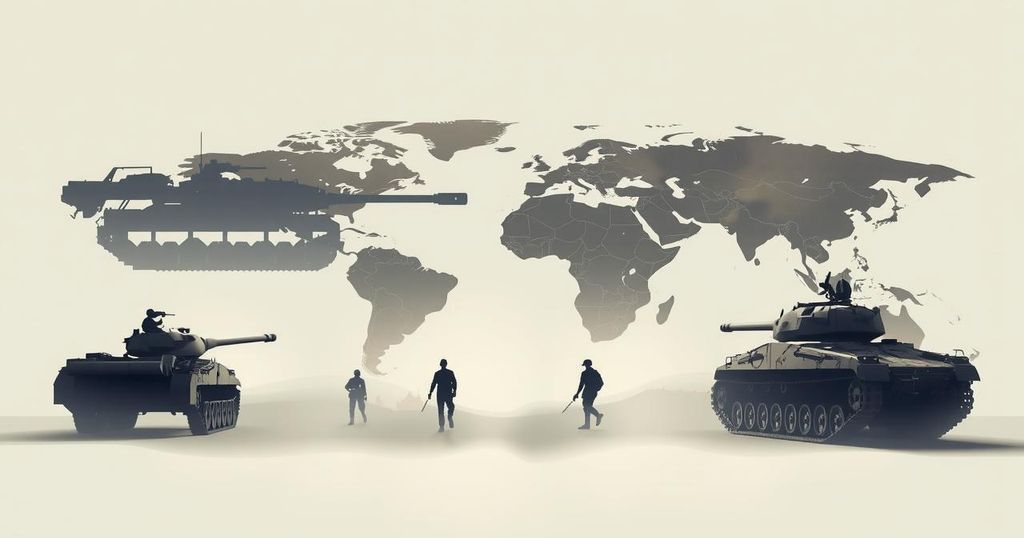Zelenskyy Warns of North Korea’s Potential Troop Reinforcement to Russia
Ukrainian President Zelenskyy suggested that North Korea may send 20,000 to 25,000 additional troops to Russia amid reports of casualties among existing North Korean forces in the Kursk region. Zelenskyy expressed concern over the treatment of these soldiers as expendable and noted that their involvement is providing them with valuable combat experience, which poses potential threats to global security.
Taipei, Taiwan – Ukrainian President Volodymyr Zelenskyy articulated that North Korea could potentially dispatch an additional 20,000 to 25,000 soldiers to Russia. This statement follows reports indicating that North Korean troops had been removed from frontline combat in the increasingly contested Kursk region of Russia due to significant casualties.
According to Ukrainian intelligence, up to 4,000 of the 12,000 North Korean soldiers deployed in Kursk late last year have either been killed or injured. Zelenskyy mentioned that while the additional Northern forces are anticipated, they have not yet reached the conflict zone.
South Korea’s military had previously indicated that North Korea is intensifying efforts to deploy more troops to Russia in response to elevated casualty rates. Ukrainian officials speculate that this new contingent may primarily consist of missile and artillery units.
Despite the increasing presence of North Korean forces, there has been no official acknowledgment from either Russia or North Korea regarding their participation in the conflict. Intelligence reports from Ukraine, the U.S., and South Korea suggest that North Korean troops have experienced heavy losses while engaged against Ukrainian forces.
Zelenskyy remarked that North Korean commanders regard their soldiers as expendable resources, stating that some have faced execution to prevent retreat. He emphasized that North Korean forces are gaining valuable operational experience, particularly in drone warfare, raising concerns about the implications for the United States and the Indo-Pacific region.
He noted that North Korean attempts to engage in recent offensives against Ukrainian forces in Kursk have not materialized, with reports indicating ongoing troop withdrawals for retraining. South Korea’s security agency confirmed that North Korean troops have not engaged in combat since January, predominantly due to the significant casualty numbers.
Additionally, reports from Ukrainian and American officials highlighted that North Korean troops have been extracted from frontline positions following heavy losses. Analysts have estimated that without a change in their casualty trajectory, North Korean forces could face depletion within about three months.
According to the Institute for the Study of War, North Korean forces have reportedly sustained approximately 92 casualties daily since their involvement in combat began last December. Citing ongoing engagement trends, they projected that the entire contingent in Kursk could be rendered non-operational by mid-April if casualties persist at the current rate.
Furthermore, Hwang Joon-kook, South Korea’s envoy to the United Nations, described North Korea’s military tactics as inhumane, emphasizing the perception of their troops as expendables. Reports suggested that North Korean soldiers are being subjected to perilous roles, likened to the function of “human mine detectors.”
In summary, North Korea’s potential reinforcement of troops to Russia is coupled with reports of heavy casualties, raising international concerns about the impact this conflict may have on regional security and military practices.
The current situation in the Kursk region, where North Korean troops are reportedly operating in support of Russian forces against Ukraine, has drawn significant international attention. The context arises from the ongoing conflict between Russia and Ukraine, and North Korea’s increasing military cooperation with Russia. Heavy casualties among North Korean troops have prompted discussions on troop reinforcements, the treatment of soldiers as expendable, and the broader implications for military strategies in the Indo-Pacific region.
In conclusion, the dynamics of North Korean troop involvement in Russia’s campaign against Ukraine present serious implications for both regional security and military tactics. With ongoing high casualty rates among North Korean soldiers and potential additional deployments, the situation requires close observation from international observers. Furthermore, the strategic lessons learned by North Korean forces may influence their future military operations, presenting a possible escalation in risk for the United States and allied nations in the region.
Original Source: www.rfa.org




Post Comment